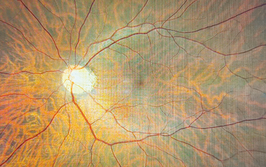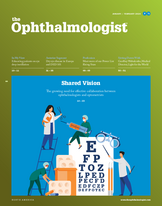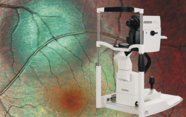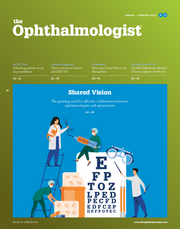
Are you still practicing ophthalmology in retirement?
I see patients for half a day per week, and these are almost all patients that I have operated on in the past. You know, one of the things that makes ophthalmology unique is that we don’t disrobe anyone, and so our life in the clinic with them is much more relaxed and social. I’ve got patients that have been with me so long they’re more like friends; last month, I saw a woman in whom I did retinal detachment surgery when she was a young woman, she was a high myope, and much later I did cataract and IOL surgery on her. When she was in for a routine exam about a month ago she said, “You know Doctor Fine, when you first told me I had to go to the hospital to have my retina fixed, my biggest concern was where I was going to get a babysitter for my two-year-old son – he just celebrated his 44th birthday!” Such contact and continuity with people over a period of decades leads to a different relationship than the average doctor-patient relationship. When our surgery is highly successful, our patients absolutely love what we do – and we love being able to provide a wonderful enhancement of their lives.
How did you wind down to half a day’s work per week – and what has helped fill the void?
I absolutely loved what I did and I never looked at work as work. And that’s why I could work so hard and long. And was I ever busy?! I invented 40 different instruments, I innovated 35 or 40 different surgical techniques, I published over 800 journal articles, I was a referee for most of the ophthalmic magazines, and I spent a great deal of time teaching and demonstrating surgery at congresses. I conducted over 40 FDA-monitored studies and worked with industry almost all of that time. But I also knew that I wanted some time in my life when I was in control of my own schedule – when I could decide, “Yes! Next Wednesday I’m going to go to our beach house.”
I started my search for the perfect retirement at the age of 55, believe it or not – but finally achieved it at 73. I talked to a lot of people, I looked at good examples, bad examples, successes and failures. But the thing that helped me most was a psychologist who worked for our clinic.
The 150 employees at our clinic are all self-insured for mental health and can have three appointments with a mental health specialist, a psychiatrist or psychologist each year at no cost. I decided that I would like to speak to a psychologist about retirement. Tom Fauria specialized in life’s transitions, so I made an appointment to see him four or five years before I retired. He asked me to send him a CV before he saw me the first time. My CV is long... 53 or 54 pages long with downsized type! In our first appointment, Tom told me point-blank that there was no way someone like me could retire without a loss of self-esteem and feelings of guilt. Why? Because my many activities nourished me. But he also had a solution.
I saw him three or four times a year for the two or three years prior to my retirement, and he helped me enormously. Through working with Tom, my practice administrator and my wife, I was able to retire in an entirely smooth way. I began about three years before retirement, taking one day off a week, then two days off, and in the last year I was working just three days a week. On my 73rd birthday, I did 20 cataract surgeries, and that was the end of my active career. And I had no trouble with it, no trouble at all, as we were prepared.
What advice were you given to help you prepare for retirement?
Basically, the psychologist emphasized ‘rational psychology,’ which differs greatly from the psychoanalytical approach of ‘uncovering’ – going back into the past and seeing what key events in your life have impacted your behavior, your thinking and your mental health. One example of rational psychology is looking at alternate ways of the meaning of things. For example, thinking, “I won’t have any more control” can bother people as they consider retirement. But if you turn the concept around and say, “I no longer have to worry about certain aspects of life,” it becomes something less threatening. And, in a nutshell, that’s the basis of rational psychology.
Everybody I know said that I would never be able to retire; I’ve had people tell me that I’d do my last cataract at the morgue, but it was really not a problem for me. On April 30 last year, I was a full eight years retired.
I really enjoy it – I do more reading than I ever did before. I’ve enjoyed watching the news at night, and being more engaged in the world in which I’m living.
I have a granddaughter who lives four blocks away so I spend a lot of time with her – and find it to be one of the greatest gifts of life. I also spend a lot of time with my son and his wife – her parents. My wife and I now have much more freedom and spend more time in our other house on the Pacific Ocean (60 blocks from our home in Eugene). My wife is very close to getting her life Master’s in Bridge, and I help as much as I can by keeping out of her way as she plays four days a week!
But I’m still involved in my profession – for several years after I retired, I was on the Executive Committees of ASCRS and the International Intraocular Implant Club, and I think between letters to the editors, comments, and co-authoring research that I started but that has been finished by my partners, I’ve ended up with about 50 publications since I retired eight years ago!
And the half day a week that I see my patients from so long ago is a pleasure rather than a burden. I consider my life as being full; I do occasionally dwell a little (in a good way) on the past, thinking about how much fun I’ve had, how much I’ve enjoyed what I’ve done – and, to be honest, how much I’ve helped people. My mother was very religious, and she was perhaps disappointed that I could never be religious like she was, but I think she took a lot of pleasure in the fact that I wanted to help people, so I was able to contribute through
my career.
Do you have any advice to people earlier in their careers?
Well, I think the advice that I give most young people is: do the things that you like to do during your career. If you start working in an area that looks like an opportunity because fewer people are working on it, but it’s not something you like, it’s a mistake. You’re going to get busier and busier, and pretty soon you’ll get stuck with it. I would also advise people to consider retirement early on. Many people tell themselves they’ll never retire or think that they don’t want to retire. But, as we age, our physical abilities leave us, and we’re less energetic. And, as we all know, we may not see as well as we once did, which could limit surgery or other activities.
By honestly considering retirement, you can see a path to it, which helps significantly. I can honestly say it was seamless for me; not one day went by when I thought, “This is a bad deal.” I simply went from loving surgery the last day I worked, to being relieved in the new peace and freedom that retirement gave me. It’s also important for people to realize that retirement need not be heavily goal-directed.
George Beiko is Assistant Clinical Professor at McMaster University, and currently practices at St Catharine’s in Toronto specializing in cataract, anterior segment and refractive surgery. George also lectures at the University of Toronto.












